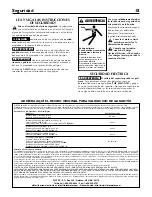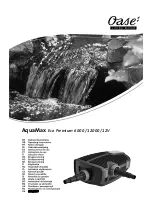
For parts or assistance, call Flotec Customer Service at
1-800-365-6832
Installation
3
GENERAL SAFETY
Do not touch an operating motor.
Modern
motors are designed to operate at high temperatures. To
avoid burns when servicing pump, allow it to cool for
20 minutes after shut-down before handling.
Do not allow pump or any system component to freeze.
To do so will void warranty.
Pump water only with this pump.
Periodically inspect pump and system components.
Wear safety glasses at all times when working on pumps.
Keep work area clean, uncluttered and properly lighted;
store properly all unused tools and equipment.
Keep visitors at a safe distance from the work areas.
Pump body may explode if used as a
booster pump unless relief valve capable of passing full
pump flow at 75 psi is installed.
SHALLOW WELL JET PUMP
INSTALLATIONS:
• Have a vertical depth between the pump and the
water being pumped of 25’ or less.
• Have one pipe from the well to the pump case.
• Can be installed in a bored or drilled well, or in a
driven well.
REPLACING AN OLD PUMP
Hazardous voltage. Disconnect power to
pump before working on a pump or a motor.
1. Drain and remove the old pump. Check the old pipe
for scale, lime, rust, etc., and replace it if necessary.
2. Install the pump in the system. Make sure that all
pipe joints in the suction pipe are air-tight as well as
water tight.
If the suction pipe can suck air, the
pump will not be able to pull water from the well.
3. Adjust the pump mounting height so that the plumb-
ing connections do not put a strain on the pump
body. Support the pipe so that the pump body does
not take the weight of piping or fittings.
You have just completed the well plumbing for your
new shallow well jet pump. Please go to Pages 5 and 6
for discharge pipe and tank connections.
WELL POINT (DRIVEN POINT)
INSTALLATION (FIGURE 1)
1. Drive the well, using drive couplings and a drive cap.
Drive fittings are threaded all the way through and
allow the pipe ends to butt against each other so that
the driving force of the maul is carried by the pipe
and not by the threads. The ordinary fittings found in
hardware stores are not threaded all the way through
the fitting and can collapse under impact. Drive fit-
tings are also smoother than standard plumbing fit-
tings, making ground penetration easier.
2. Mount the pump as close to the well as possible
3. Use the fewest possible fittings (especially elbows)
when connecting the pipe from the well point to the
pump suction port. The suction pipe should be at
least as large as the suction port on the pump
(include a check valve as close to the well as possi-
ble - see Figure 1). Support the pipe so that there are
no dips or sags in the pipe, so it doesn’t strain the
pump body, and so that it slopes slightly upward
from the well to the pump (high spots can cause air
pockets which can air lock the pump). Seal the suc-
tion pipe joints with teflon tape. Joints must be air-
and water-tight.
If the suction pipe can suck air, the
pump cannot pull water from the well.
If one well
point does not supply enough water, consider con-
necting two or three well points to one suction pipe.
You have just completed the suction piping for your
new shallow well jet pump. Please go to Pages 5 and 6
for discharge pipe and tank connections.
WARNING
Hazardous pressure!
Install pressure relief
valve in discharge pipe.
Release all pressure on
system before working on
any component.
Drive
Coupling
Drive
Point
Drive point
below water
level
Pump Priming Tee and Plug
(Replace plug with pressure
Gauge if desired – purchase
separately)
To Household
Water System
Suction Pipe
From Well
Check
Valve
Priming
Tee and
Plug
Not
to
Scale
Figure 1 – Driven Point Installation




































